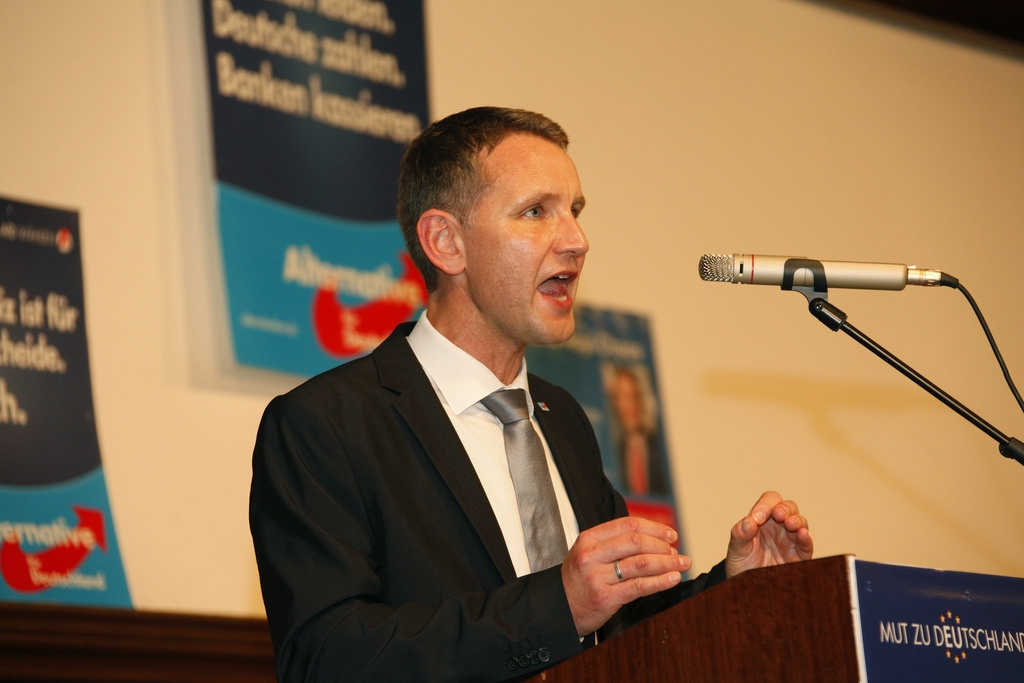Germany and the UK: Weaponising History
Last Tuesday, in a beer hall in Dresden a former German history teacher, Björn Höcke, declared:
“Until now, our mental state continues to be that of a totally defeated people. We Germans are the only people in the world that have planted a monument of shame in the heart of their capital.”
The monument in question is the Denkmal für die ermordeten Juden Europas (The monument for the murdered Jews of Europe) inaugurated in 2005. It consists of 2,711 concrete slabs and covers 4.7 acres. It was designed by architect Peter Eisenman and engineer Buro Happold, with the intention of presenting to any onlooker an uneasy feeling, contrasting a sense of order with a lack of humanity. Since its inception in the 1980’s, the monument has been a source of conflict. The lack of inscriptions naming perpetrators, or the lack of Jewish religious symbols have been a source of contention and even how the space is used by visitors is in continual debate. In the same week as Höcke’s speech, a website, Yolocaust.de from the artist, writer and satirist Shahak Shapira went live depicting visitors climbing, posing and taking selfies next to the monument. When you scroll over these images, the monument background disappears and is replaced by harrowing images from the concentration camps. The contrast between smiling teens and piles of dead bodies begs the question; how should we remember and how should we act at the monument to the holocaust?
The question of remembrance was at the heart of Höcke’s speech, given on behalf of his party, Alternative für Deutschland (AfD). The event in Dresden was hosted by the AfDs youth organisation, but tellingly was attended by elderly supporters. Germany, he declared, had to make a “180 degree turn” from the way it remembered the past. Children were not being educated on the positive side of German history and were instead subjected to a German historical perspective that looked “mean and ridiculous”. It was a speech designed to shock and gain maximum outrage around the country. Within hours, #Höcke was a trending topic on Twitter as the German public, media and political leaders roundly denounced his words.
The denunciations continued through the weekend, with demands that Höcke resign or that he be sacked. The AfD leadership, after a three hour telephone conference, decided that sacking or resignation would be too harsh even though they too found his speech unacceptable. “there are also things that just don’t belong to the AfD. And that includes [Höcke’s] speech.” stated the executive member, Dirk Driesand. Instead, Höcke would be subjected to unnamed disciplinary action. A slap on the wrist for a man prepared to slap his country in the face.
Björn Höcke,
What should the outside observer make of this incident? Every political party has fringe members, those people who, despite all logic, descend into incoherence and uninformed opinion. Yet, Höcke was a history teacher. He knew as well as any other teacher the importance placed on teaching children about their diverse and storied culture, while also educating them on a period of German history that has defined much of German life and politics since 1945. What might bring someone to simply ignore all that he knows to be true and construct a speech that is so ill informed and badly executed that it leads his political party into the dangerous comparison with National Socialism? One might declare that this is the new dawn of ignorance and fact manipulation, where propaganda is called “fake news”, Nazis are “Alt-right” and lies are simply “Alternative facts”.
The truth of the matter is that what Germany saw last Tuesday was the first shots of an extreme political strategy, the goal of which is to propel the AfD into a spotlight of positivity. Leaked information from a AfD meeting in December between party heads had called for a tactic of “carefully planned provocation” that would illicit such unfair reactions from the AfDs critics that it will stigmatise the party. Through this stigmatisation, the AfD will begin to be seen as whipping boy by the public, a misunderstood group who only wish the best for Germany, if only the “lügen-presse” would give them a chance. Then, when the election comes around in the Autumn, the AfD will reap the dividends. It can’t have been simple serendipity that the Saturday following Höcke’s speech saw AfD co-leader Frauke Petry hosting French presidential candidate Marine Le Pen and Geert Wilders, the Dutch anti-Islam Freedom Party leader at a “counter summit” in Koblenz.
For politicians around the world, history is a useful asset. If it can be weaponised to win political capital, even better. It especially helps if the history being used is easily misunderstood by the public at large. In the UK, history or rather a particular parts of history, are routinely used and manipulated for everything from simple point scoring to actively gaining votes. Modern Britain has for a long time perceived itself as an island of difference, based firmly on the idea of the indomitable island nation. In school we are told that we haven’t been invaded since 1066 (except for when we were in 2 June 1216 and in 5th November 1688). We built an Empire on which the “sun never sets” that brought liberal democracy, economic reform and general decency to our colonial territories, except for when it was massacring, enslaving and stealing all it could get its hands on. So poorly is the topic of Empire taught in UK schools that a 2016 poll showed 44% of people believed it was a good thing, while only 19% disagreed.
The UK has for a long time perceived other nations by the wars they have had; Spain are big shots who saw their Armada defeated by plucky British sailors, France surrenders too easily, Italy switch sides when pressed, Russia are formidable but we had them in the Crimea and the US, well they won eventually, but we gave them a good scare in 1812. Yet, of all the areas of history that UK politicians like to manipulate, World War II is top of the list.
Nigel Farage, during the Brexit campaign, travelled around on a bus that blared the theme from “The Great Escape” stating "That's what we need, isn't it? A great escape from this European Union!". Winston Churchill was paraded by both leave and remain supporters, former Prime Minster David Cameron stating:
“In the post-war period he (Churchill) argued passionately for Western Europe to come together ... so that our continent would never again see such bloodshed,”
At one point, Churchill’s living relatives were asked how he would have voted, predicting he would have gone for remain. Boris Johnson, leader of the leave campaign and now Foreign secretary tends to use WWII as a rod to whip his enemies. In typical Johnsonian fashion, he merrily compared the EU to Hitler saying:
“Napoleon, Hitler, various people tried this out, and it ends tragically. The EU is an attempt to do this by different methods,"
For a supposedly well educated man, Boris seems incapable of making any other comparison. He started 2017 by asking French President François Hollande, not to “administer punishment beatings to anyone who chooses to escape, rather in the manner of some world war two movie” following Brexit. It is a political fact that if you wish to rile the British electorate, always mention the war.
The historian John Tosh stated in his book “Why History Matters” that:
“Analogies that are based on bad history and merely provide specious support for a particular policy need to be exposed for what they are, before they do too much damage”.
The UK is susceptible to bad history, but Germany isn’t. Björn Höcke, Frauke Petry and the AfD are not finished using German history against itself, but the foundation of the German Republic is based on the promises it has made to itself since the end of World War II.











